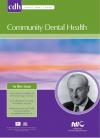Community Dental Health

- Cover Date:
- June 2007
- Print ISSN:
- 0265 539X
- Vol:
- 24
- Issue:
- 2
Dietary patterns, toothbrushing habits and caries experience of schoolchildren in West Yorkshire, England.
Objective and method: The present study followed a group of 608 children, aged 7-11 years from six primary schools, for whom detailed dietary information was available. These children were traced four years later when they were in secondary school. The aim of the study was to investigate the relationship between the original dietary pattern, current dietary pattern, toothbrushing habit and oral health. Of the original children, 500 were traced to 32 secondary schools over a wide geographic area. For logistical reasons those in 18 schools were selected and positive consent and full data was obtained for 315 together with an additional group of 122 of their classmates. Three-day, self-reported dietary data was obtained, together with information on toothbrushing habits. A dental examination was carried out using BASCD survey methodology. Results: The children in this study had a lower DMFT (0.82) than found in the most recent survey for the area (1.39). No signiï¬cant relationship was found between sugar-sweetened foods or drinks at age 7-11 and caries in the ï¬rst permanent molar teeth at age 11-15 years, however a signiï¬cant relationship was found between current sugar-sweetened drinks consumption and caries. Signiï¬cantly less caries was associated with the reported moderate consumption of dairy products by the children when aged 1115 years. The bedtime consumption of NMES drinks at 7-11 was signiï¬cantly associated with an increase in caries as was the bedtime consumption of non-milk extrinsic sugars (NMES) foods at 11-15 years. A signiï¬cant inverse relationship was found between claimed toothbrushing frequency and caries. Of those children aged 11-15 years claiming to brush at least once a day, 69% were caries-free with a mean DMFT of 0.69. Of the children who claimed to brush only occasionally or never, 52% were caries-free and they had a mean DMFT of 1.05. Conclusion: The reported consumption of sugar-sweetened drinks and the lack of regular toothbrushing were found to be the factors most strongly linked to caries and this ï¬nding is consistent with other recent studies.
Key words: Dental caries, diet, toothbrushing.
- Article Price
- £15.00
- Institution Article Price
- £
- Page Start
- 82
- Page End
- 87
- Authors
- R.S. Levine, Z.J. Nugent, M.C.J. Rudolf, P. Sahota
Articles from this issue
- Title
- Pg. Start
- Pg. End
- The cost-effectiveness of adding fluorides to milk-products distributed by the National Food Supplement Programme (PNAC) in rural areas of Chile
- 75
- 81
- Dietary patterns, toothbrushing habits and caries experience of schoolchildren in West Yorkshire, England.
- 82
- 87
- Prevalence and severity of dental caries in 5- and 12-year old children in the Veneto Region (Italy)
- 88
- 92
- Reliability methodology in caries epidemiological studies conducted in the Nordic countries between 1990 and 2001
- 97
- 104
- The reproducibility of the Denplan Oral Health Score (OHS®) in general dental practitioners
- 105
- 110
- Challenges associated with the evaluation of a dental health promotion programme in a deprived urban area
- 117
- 121
- Dental caries and associated factors among young male adults between 1999 and 2003 in Southern Brazil
- 122
- 127
